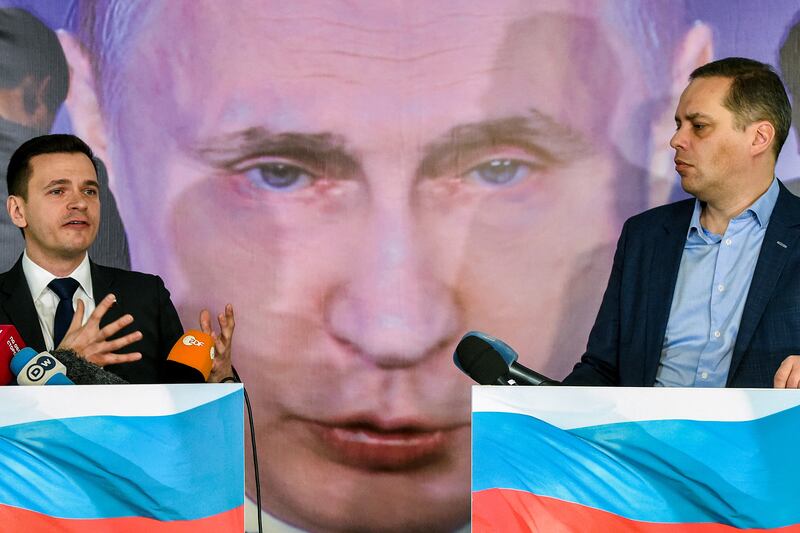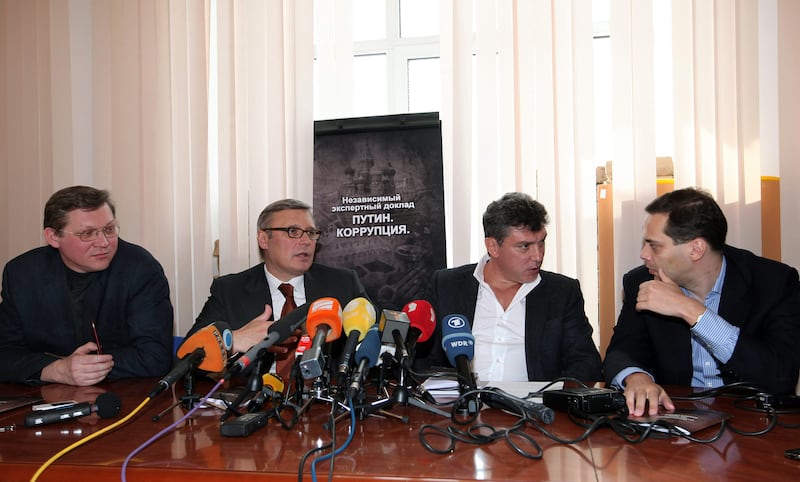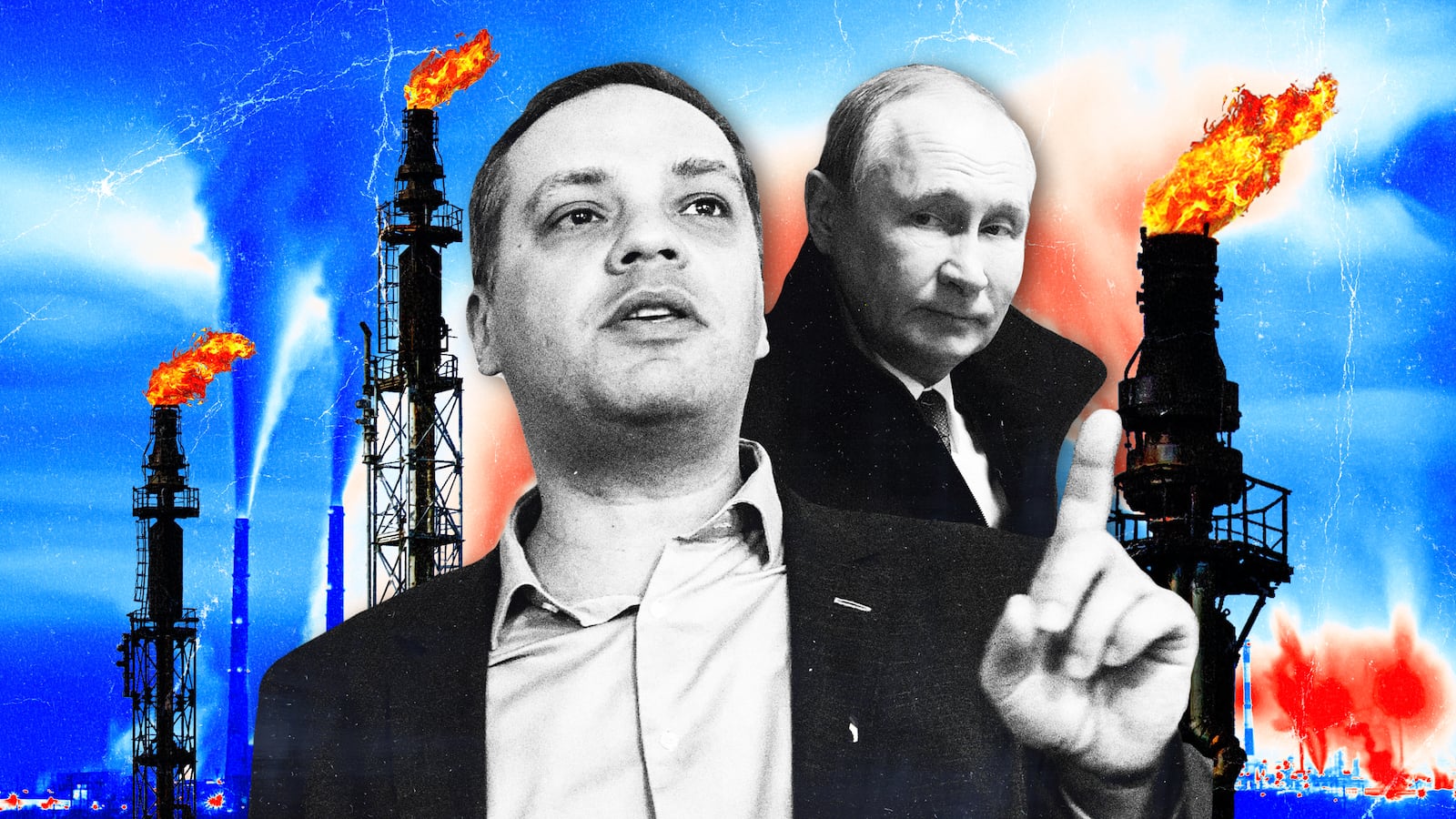PARIS—There is no doubt Russian President Vladimir Putin wants to liquidate Vladimir Milov.
Milov has been a Russian-on-the-run since 2002. He is today unmistakably the most menacing desperado on Putin’s Most Wanted Fugitive list. Yet the mild-mannered graduate of Moscow State Mining University is neither a defenestrated lawyer nor an academic outcast for railing against the war in Ukraine. The 50-year-old former Deputy Minister of Energy is Putin’s most fearsome nightmare precisely because he speaks in tongues.
Milov’s language is built on BTUs, BOPs and FPSOs, the strange-sounding and complex acronyms used in the oil and gas industry, the business whose profits underwrite Putin’s Ukrainian bloodshed.
In an interview with The Daily Beast from Paris, Milov says the proverbial bottom line of Putin’s ham-fisted control over the 10 or so energy companies responsible for overseeing Russian oil and natural gas can be easily translated into English, Russian, or Klingon.
“Putin is no longer able to sell Russia’s energy at a profit,” Milov says, sitting in a conference room that overlooks the Seine River. “Russia is losing money on discounted deals he’s made with countries such as India and Turkey.”
Perhaps the only dynamic more difficult to digest than Putin’s major energy problem is to understand the ruthless reality of being Vladimir Milov.
Milov’s troubles began in 2002, when the Kremlin ordered him to submit a plan to restructure the oil and gas giant Gazprom. At the same time, Putin was putting the finishing touches on his 2003 scheme that seized the majority state-owned firm’s chief competitor Yukos, sending its founder, the now-exiled dissident Mikhail Khordorkovsky, off to count the birch trees in Siberia for 10 years on ambiguous charges of fraud, tax evasion, and other economic crimes.
“Putin condemned my plan as dangerous for Russia’s national security,” Milov says. “Meeting with Putin was always weird,” he adds. “I kept asking myself, ‘How could this little gray mouse become the president of Russia?’”
It was a question Putin answered by jailing Milov’s pals and fellow reformers, Alexei Navalny and Vladimir Kara-Murza, both of whom survived bungled assassination attempts. Another of Milov’s anti-Putin activist friends, the physicist and former Deputy Prime Minister Boris Nemtsov, was gunned down in 2015, two days before he was scheduled to participate in a rally against Putin’s war in eastern Ukraine and the looming financial crisis.

Russian opposition activists Ilya Yashin (L) and Vladimir Milov present a report titled “Putin. Results. 2018,” in Moscow on March 14, 2018.
Vasily Maximov/AFP via GettyAccording to Navalny’s Anti-Corruption Foundation, Putin since the end of February has arrested some 18,000 dissidents at a rate of approximately 88.8 per day. Milov says rounding up foes is one of the few things Putin is really good at and, as far as he’s concerned, changing the KGB’s name to the FSB was a sclerotic attempt to cosmetically rebrand the secret police.
“The KGB has so far visited the homes of some 60,000 people, threatening them with prison if they protest Putin, the war or anything else,” Milov says. “The door-knocks echo fast throughout the community. The atmosphere of fear is very strong.”
Milov eventually skedaddled to the relative safety of Lithuania, where he crunches numbers, works with dissident groups, and decodes what he says are the mostly bogus statistics designed to make the West believe Russia is an energy colossus.
“You must understand, the KGB is always there,” is how Milov describes his life on the lam from a maniacal superpower, whose fiendish leader this week moved to mobilize 300,000 additional soldiers and once again threatened to launch nuclear weapons against Western capitals.
Milov is between two stools on limp sanctions against Putin’s approximately 6,000 oligarchs, of whom only between 46 and 200 have been effectively shut down, according to the Anti-Corruption Foundation.
“The sanctions are not working as fast as the West had thought,” Milov says, pouring sugar into a cup of problematically sourced lukewarm coffee from what appears to be a sealed packet. “But Russia’s industrial output is down 60 to 80 percent and, in terms of high technology, Putin is already back in the Stone Age.”
Milov leisurely stirs the white crystals without blinking an eye. “Russia will not collapse,” he adds. “It will degrade under Putin until the country is completely detached from the modern age.” His long fingers tap the paper cup. He sips.
“The Russian population is scared,” Milov says after downing his coffee safely. “I do not and cannot afford to ask myself if I am scared,” he adds. “The great awakening will come when the Russian people learn what he has done in Ukraine. They will be ashamed, and they will send Putin away to stand trial for war crimes.”
Although the likelihood of Putin pleading his case in front of an international jury appears remote, Milov insists the math adds up to Putin having a much shorter time freely wandering the Kremlin than his publicists want the West to believe.
“More than 4.5 million Russians are only working part-time and they’re not getting paid enough money,” Milov says, firing off numbers with the fury of a Gatling gun. “That’s 13 percent of a workforce that hasn’t seen any wage-growth in 20 years. The exodus of Western oil companies has decreased energy production by at least 25 percent, and Putin is flaring tens of millions of dollars of our natural gas supplies on TV to show the West that he doesn’t care.”
Flicking an olive pit into his empty cup, Milov maintains the sanctions will have a profound long-term effect, “regardless of how many heads Putin bashes with patriotic propaganda,” he says.

People’s Freedom Party, (L-R) Vladimir Ryzhkov, Mikhail Kasyanov, Boris Nemtsov, and Vladimir Milov, speak to the media in Moscow on March 28, 2011.
Alexey Sazonov/AFP via Getty“Putin thinks he has complete energy dominance and can outlast the West,” Milov adds. “Tell me, what oil or gas trader would be willing to sign a futures contract with him? Russia is gone as a major energy supplier. Any company that can’t pay its bills goes bankrupt.”
Milov dismisses as ludicrous Putin’s ballyhooed scheme to build a gas pipeline from Siberia to China. “That would cost $200 billion Putin doesn’t have,” Milov explains. “He fails to realize that China has significant domestic supply and long-term contracts with foreign suppliers. Don’t buy into Putin now selling China some energy, because he’s selling it to them at a 30 percent discount and mostly untaxed domestically. Russia isn’t making any money on that deal. It’s losing money and lots of it.”
Another red herring is Putin’s gambit to ship crude oil to India and Asia. “It’s all discounted,” Milov says. “No profit. It takes more than a month for a tanker to reach India, and that’s not factoring in the traffic bottlenecks, which add an extra $10 or more per barrel on Russia’s costs. There’s no significant long-term profit in Asia.”
Milov’s greatest concern is Israel and the deteriorating economy in hard currency-poor Turkey. “Both governments are luring Putin with deals, particularly in digital components and hardware, but they’re jacking up the price 300 percent above the free market cost.”
For the moment, Milov is keeping a brave face, mainly by looking at his numbers. Western leaders, he advises, should do the same. It’s a waiting game, albeit a deadly one.
Still, Milov reckons Putin’s behavior has drastically changed. “He’s now running around the world, a carpetbagger begging for help,” he says. “It might seem a small detail, but it’s an important psychological detail. Putin needs help, and he’s not getting much of it.”







